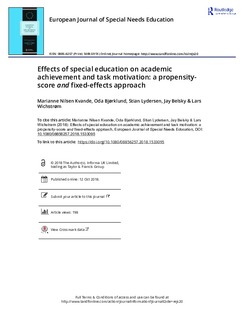Effects of special education on academic achievement and task motivation: a propensity-score and fixed-effects approach
Journal article, Peer reviewed
Published version
Permanent lenke
http://hdl.handle.net/11250/2574041Utgivelsesdato
2018Metadata
Vis full innførselSamlinger
- Institutt for psykologi [3103]
- Publikasjoner fra CRIStin - NTNU [38127]
Originalversjon
10.1080/08856257.2018.1533095Sammendrag
As traditional teaching methods may fail to serve children with special needs, special education (SE) services aim to compensate for the shortcomings of conventional schooling. However, despite of numerous studies on the effectiveness of SE services, the influence of potential selection bias remains a real challenge, and only a few studies have applied methodology aiming to surmount these shortcomings. Therefore, by combining two methods (i.e. propensity score and fixed effects regression) to account for potential confounders, we examined the effects of receiving SE services in first and third grades on Norwegian students’ academic achievement and task motivation in third and fifth grades (n = 745). Thus, we controlled for a propensity score that was calculated based on observed selection into SE, and combined this with fixed effects regression that has the advantage of ruling out all time-invariant confounders (e.g. genetics). Results revealed that SE in third grade adversely affected math achievements in fifth grade, and SE had no effect on reading and writing achievements or task motivation for reading, writing and math. The efficacy of SE services is called into question, and potential explanations and solutions are explored.

